February 20, 2025
100 Books for Algorithmic Trading Professionals – Part 2: Math & Statistics for Trading
By Axon Trade Team
This article is part of the "100 Books for Algorithmic Trading Professionals" series prepared by the Axon Trade team. Read other parts here:
Part 1: Foundations of Algorithmic Trading
Part 2: Math & Statistics for Trading
Part 3: Coding & Tools
Part 4: AI & Machine Learning in Trading
Part 5: Portfolio Optimization & Risk Management
Part 6: Case Studies and Real-World Stories
Part 7: Trading Psychology
Intro
Markets move in numbers. Every trading strategy, risk model, and execution decision relies on mathematics and statistical methods. Probability, calculus, and financial modeling help traders quantify uncertainty, analyze patterns, and improve decision-making.
This selection of books covers the core mathematical principles behind algorithmic trading. From probability theory to statistical arbitrage, these resources provide the tools to interpret data, measure risk, and refine trading models.
Statistics and Data Analysis for Financial Engineering
Author: David Ruppert, David S. Matteson
Published: 2015
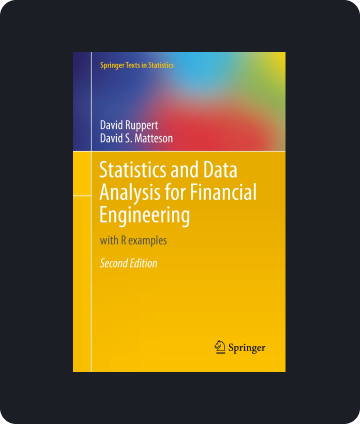
This updated edition provides graduate and advanced undergraduate students with key statistical tools for financial engineering, emphasizing practical applications using R. It integrates concepts such as volatility analysis, risk assessment, multivariate distributions, copulas, and Bayesian methods, illustrated through financial market and economic data. R Labs with real-data exercises strengthen its focus on applied learning.
The book also addresses advanced topics like cointegration and risk management, complemented by an appendix on statistics, probability, and linear algebra. Designed for those with a foundation in mathematics and statistics, it serves as a valuable resource for both students and financial engineering professionals.
Mathematics for Finance: An Introduction to Financial Engineering
Author: Marek Capiński, Tomasz Zastawniak
Published: 2010
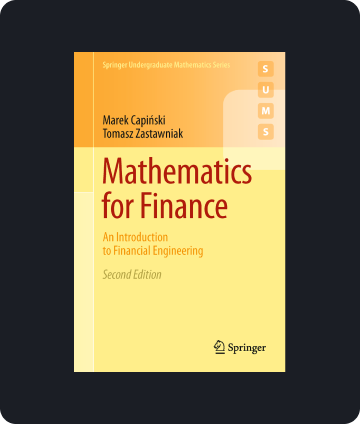
This text bridges financial concepts and mathematics, requiring only foundational knowledge of probability and calculus. It explores three main areas: option pricing using the no-arbitrage principle in discrete and continuous time, Markowitz portfolio optimization and the Capital Asset Pricing Model, and stochastic interest rate models in discrete settings.
Aimed at undergraduate students, the book emphasizes clarity and practical application, making complex financial engineering topics accessible. It offers a structured introduction to mathematical finance, ideal for those beginning their exploration of the field.
Statistical Arbitrage: Algorithmic Trading Insights and Techniques
Author: Andrew Pole
Published: 2007
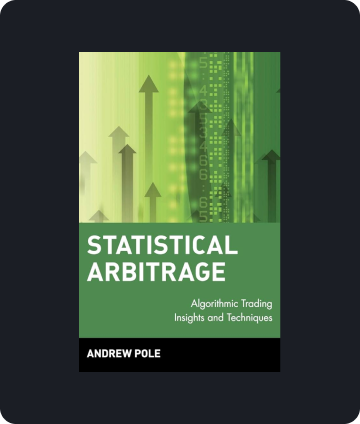
Andrew Pole explores the evolution of statistical arbitrage, a strategy rooted in pairs trading, revitalized by developments in algorithmic trading since 2000. Drawing on eight years of experience managing a statistical arbitrage hedge fund, the book offers detailed insights into strategy modeling, risk management, and implementation.
Targeting investors and quantitative analysts, it combines theory with practical applications, making it a valuable resource for understanding a disciplined investment approach and adapting it to modern markets.
Mathematics of Financial Markets
Author: Robert J Elliott, P. Ekkehard Kopp
Published: 2004
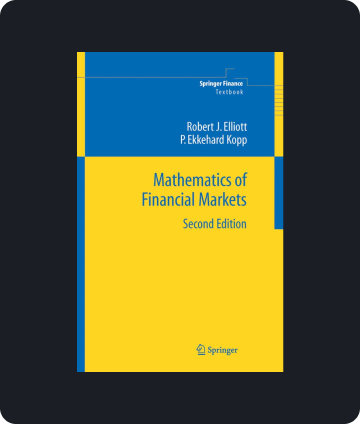
This book focuses on applying mathematical concepts like martingale theory to financial markets. It begins with foundational topics such as single-period and multi-period binomial models, European option pricing, and risk-neutral measures. Readers are guided through rigorous explanations while connecting theory to financial instruments.
Designed for those with a solid background in probability and linear algebra, it offers accessible insights into key financial applications without delving into overly exotic models. Ideal for graduate students in mathematics or anyone seeking a mathematical perspective on market behavior.
Probability Theory: A Comprehensive Course
Author: Klenke Achim
Published: 2013
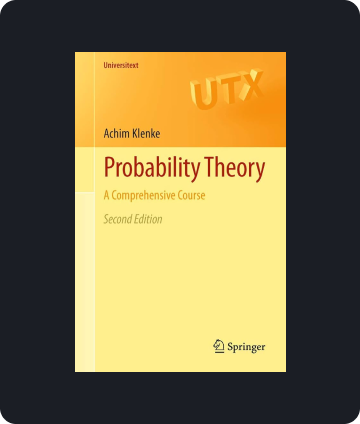
The second edition of this textbook offers an in-depth exploration of modern probability theory, blending theoretical foundations with practical applications. It features over 270 exercises to reinforce learning and includes biographical insights into key contributors to the field.
This course is designed for students and professionals seeking a comprehensive understanding of probability, covering core principles and advanced topics with clarity and rigor.
Stochastic Calculus for Finance I: The Binomial Asset Pricing Model
Author: Steven Shreve
Published: 2005
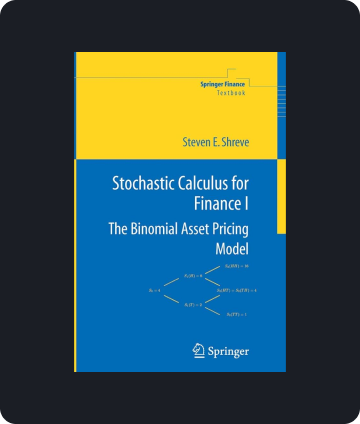
This textbook introduces stochastic calculus with a focus on the binomial asset pricing model, serving as a foundation for understanding continuous-time finance. It covers essential topics such as probability theory, Brownian motion, forward measures, and jump-diffusion processes, offering a clear explanation of the mathematical principles required for financial modeling.
The book is designed for advanced undergraduates and master’s students in quantitative finance and includes chapter summaries, practical exercises, and real-world problem applications. It provides both theoretical concepts and intuitive examples, making it a valuable resource for those pursuing expertise in financial engineering and computational finance.
Stochastic Calculus for Finance II: Continuous-Time Models
Author: Steven Shreve
Published: 2010
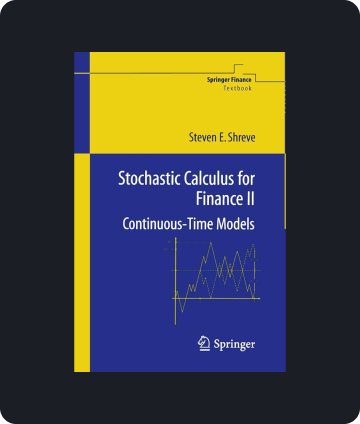
This text, designed for students in the Carnegie Mellon Master’s program in Computational Finance, covers continuous-time models used in financial mathematics. It includes a wide range of examples, exercises, and references, focusing on the development of tools for working with stochastic processes and financial models. The material builds upon concepts from differential and integral calculus as well as basic probability theory, introducing more complex subjects as the text progresses.
Unlike other texts that assume prior knowledge of measure-theoretic probability, this book provides an informal approach to the development of these tools. It aims to bridge the gap between foundational calculus and the advanced concepts used in financial modeling, making it accessible to those without a measure-theoretic background while still ensuring that all necessary mathematical principles are covered.
Financial Calculus: An Introduction to Derivative Pricing
Author: Martin Baxter, Andrew Rennie
Published: 1996
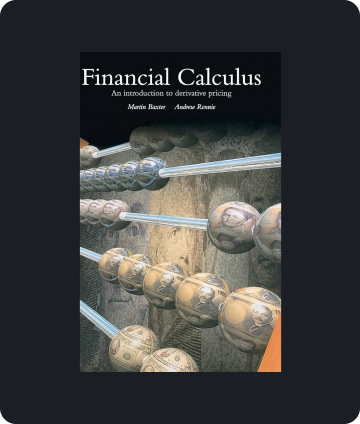
This book offers a precise introduction to the mathematics behind derivative pricing and hedging, focusing on key concepts like martingales, change of measure, and the Heath-Jarrow-Morton model. It covers both discrete-time and continuous-time models, including the Black-Scholes method.
The text emphasizes practical applications with examples from stock, currency, and interest rate markets. It provides a clear understanding of financial derivatives, making it a valuable resource for professionals in the field.
An Introduction to Probability and Mathematical Statistics
Author: Howard G. Tucker, Ralph P. Boas
Published: 2014

Focusing on the core principles of probability and statistics, this book introduces key concepts such as random variables, probability distributions, and point estimation. It also covers topics like conditional probability and statistical hypothesis testing, essential for understanding statistical inference.
The latter chapters delve into estimation techniques and the theory of confidence intervals, providing a practical approach to statistical analysis. This book is highly useful for undergraduate students pursuing mathematics, physics, or related fields with a focus on abstract mathematical ideas.
Quant Probability: 100 Interview Questions (Advanced Topics in Quantitative Trading)
Author: X.Y. Wang
Published: 2023
.png)
Aimed at professionals preparing for quantitative finance interviews, this guide covers key topics like probability theory, financial modeling, and advanced techniques in derivative pricing and risk management. It also offers insights into machine learning and AI applications in finance.
With clear explanations and 100 carefully selected interview questions, this resource prepares you for the competitive world of quantitative finance, helping you confidently approach even the most complex interview challenges.
Stochastic Calculus for Quants: Questions and Answers (Advanced Topics in Quantitative Trading)
Author: X.Y. Wang
Published: 2023
.png)
This book provides a comprehensive guide to stochastic calculus, designed for aspiring quantitative analysts. It covers fundamental concepts like Brownian motion, Ito’s lemma, and stochastic processes, progressing to advanced topics such as option pricing, volatility models, and the Bergomi model.
With practical examples and a structured approach, it delves into quantitative finance’s key applications, including volatility modeling and stochastic PDEs. This resource is invaluable for anyone looking to deepen their understanding or prepare for interviews in the field.
Conclusion
Mathematics is at the core of quantitative trading. A deep understanding of probabilities, statistical models, and market dynamics allows traders to develop more structured and reliable strategies. The books in this list offer both foundational knowledge and practical techniques for applying math in finance.
At Axon Trade, we help traders turn these principles into action. With real-time market data, FIX API access, and advanced execution tools, our platform supports data-driven decision-making at every stage of the trading process.
Looking for more insights? Continue exploring the series:
Previous: Part 1: Foundations of Algorithmic Trading
Next: Part 3: Coding & Tools
